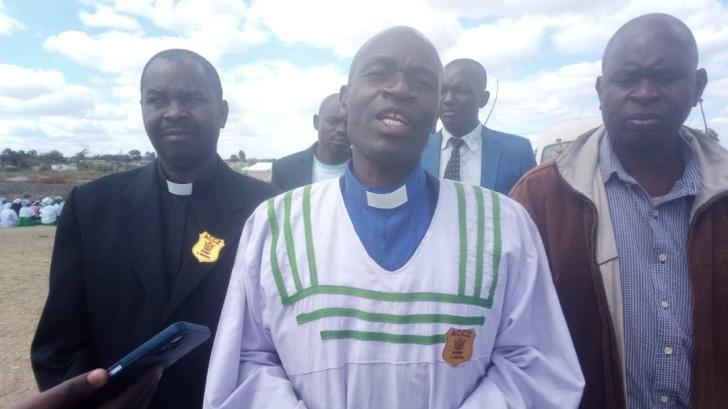News / National
Churches to intensify Highways carnage cleansing
26 Aug 2024 at 21:42hrs |
0 Views

In the wake of road carnage, indigenous churches have promised to intensify spiritual prayer cleansing ceremonies meant to arrest the scourge including educational awareness and multi-stakeholders engagement.
Speaking on the sidelines of their church's 10th anniversary celebration in Epworth (Solani) over the weekend, founder of the Kuera Apostolic Church, Arch-Bishop Honest Mupepe has expressed their commitment towards reducing spike in road carnage.
"We have decided to improve our fight against road carnage through intervening spiritually. As you have witnessed previously, we embark on a spiritual cleansing of Beitbridge Highway and the country enjoys a reduction in road carnage that period," Mupepe said.
"We have gathered more than ten apostolic and pentecostal indigenous churches in our quest to spread these cleansing along our major highways including Mutare which has become a major death trap countrywide," Mupepe added.
"As indigenous churches, we express our gratitude to the government for ensuring development of our road infrastructure which ensures safe and efficient traffic flow amongst our cities. The only thing that is left is for spiritual complement of the same infrastructure to reduce spike in accidents," Mupepe said.
Meanwhile, Bishop Gladys Tukunyuku has also echoed the same sentiments claiming it is high time indigenous churches should consider multi-stakeholders engagement to reduce road carnage along major highways.
"Road carnage require complex initiatives through multi-stakeholders engagement. This involves educational awareness amongst road users, uses of proper road signage, avoid driving at night, adhering to prescribed speed limits, among others," Tukunyuku said.
"There is also need to train ambassadors who will visit various communities along major highways and teach them how to monitor movements of livestock adjacent to high accident zones. Opinion leader or local authorities including chiefs and village heads should also get involved in training their local citizens so that they drive the message to their subjects as defined by their contextual frameworks," Tukunyuku said.
Meanwhile, Traffic Safety Council of Zimbabwe managing director Munesu Munodawafa said that Zimbabwe is losing over US$400 million in costs related to road traffic accidents every year.
Munodawafa announced that at least 150 people die in an average of 4 250 accidents that occur every month throughout the country.
He added that it was disturbing that the country continued to register a high rate of accidents when there were so many driving schools.
Munodawafa added that on average, 6 people die in road traffic accidents every day, which translates to over 150 people per month, while 38 people are injured daily, adding that a road traffic accident is recorded every 15 minutes in the country.
"At least 4 250 is the average number of accidents caused by your products every month. These are the students whom you taught and who passed their examinations and are causing these accidents," Munodawafa said.
"Last year 2 099 which I think is about 5.8 people who die every single day on our roads. These are your products who are causing this. The students who would have passed through your driving schools and passed their tests are the ones who are giving us these figures," said Munodawafa then while addressing driving school owners.
Speaking on the sidelines of their church's 10th anniversary celebration in Epworth (Solani) over the weekend, founder of the Kuera Apostolic Church, Arch-Bishop Honest Mupepe has expressed their commitment towards reducing spike in road carnage.
"We have decided to improve our fight against road carnage through intervening spiritually. As you have witnessed previously, we embark on a spiritual cleansing of Beitbridge Highway and the country enjoys a reduction in road carnage that period," Mupepe said.
"We have gathered more than ten apostolic and pentecostal indigenous churches in our quest to spread these cleansing along our major highways including Mutare which has become a major death trap countrywide," Mupepe added.
"As indigenous churches, we express our gratitude to the government for ensuring development of our road infrastructure which ensures safe and efficient traffic flow amongst our cities. The only thing that is left is for spiritual complement of the same infrastructure to reduce spike in accidents," Mupepe said.
Meanwhile, Bishop Gladys Tukunyuku has also echoed the same sentiments claiming it is high time indigenous churches should consider multi-stakeholders engagement to reduce road carnage along major highways.
"Road carnage require complex initiatives through multi-stakeholders engagement. This involves educational awareness amongst road users, uses of proper road signage, avoid driving at night, adhering to prescribed speed limits, among others," Tukunyuku said.
Meanwhile, Traffic Safety Council of Zimbabwe managing director Munesu Munodawafa said that Zimbabwe is losing over US$400 million in costs related to road traffic accidents every year.
Munodawafa announced that at least 150 people die in an average of 4 250 accidents that occur every month throughout the country.
He added that it was disturbing that the country continued to register a high rate of accidents when there were so many driving schools.
Munodawafa added that on average, 6 people die in road traffic accidents every day, which translates to over 150 people per month, while 38 people are injured daily, adding that a road traffic accident is recorded every 15 minutes in the country.
"At least 4 250 is the average number of accidents caused by your products every month. These are the students whom you taught and who passed their examinations and are causing these accidents," Munodawafa said.
"Last year 2 099 which I think is about 5.8 people who die every single day on our roads. These are your products who are causing this. The students who would have passed through your driving schools and passed their tests are the ones who are giving us these figures," said Munodawafa then while addressing driving school owners.
Source - Byo24News
Join the discussion
Loading comments…





























